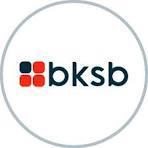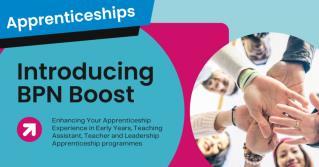






A very warm welcome toBest Practice Networkapprenticeships.We’re excitedtoworkwithyou and support you throughout your apprenticeship. Our team is here to help you succeed and make the most of this opportunity, so please contact us if you have any questions. This handbook contains important information. Please keep it safe and refer back to it when needed.
Best Practice Networkisone of the UK’s largest providers of training, development and support for education professionals. Like you, we believe that every child, whatever their background, deserves an excellent education.
Our core values define who we are and guide the way we work. They help us provide the best possible service to our learners and partners.

We aim to change lives for the better by inspiring and developing colleagues working in education. As a team and a network, we inspire each other to grow personally and professionally.

Across the network, personal relationshipsand collaborationare at the heart of what we do. We show care and support for our candidates,partners and colleagues,and we go the extra mile to get things done.

We can be trusted and we do what we say we will. We are open and straightforward, tackling challenges head-on rather than avoiding them. We treat each other with respect and dignity.

We have high expectations of ourselves and others. We invest and innovate to deliver the best learning,systemsand outcomes. We keep things simple, use evidence and embrace change to achieve our best.

Phone: 0117 920 9200
Email: apprenticeships@bestpracticenet.co.uk
Tutor contact details (write name/contact details here)
Report a safeguarding concern:
https://www.bestpracticenet.co.uk/safeguarding safeguarding@bestpracticenet.co.uk
Your tutor is your first point of contact. They’ll guide you, support you and help you make the most of your apprenticeship.

What is an apprenticeship?
What to expect from your apprenticeship
Apprenticeship levels
Understanding your apprenticeship elements
Your programme at a glance
First day of learning (FDOL)
Induction
On-programme learning
Gateway to completion
Apprenticeship Assessment
Your responsibilities as an apprentice
What you can expect from us
Roles within apprenticeship delivery
Your learning
Additional learning support
Career development and wellbeing
BPN Boost
Safeguarding
Policies and procedures
Change of circumstances
Useful information and links
Glossary

An apprenticeshipis a work-based learning programme. It combines hands-on experience with training, so you can earn a wage while you gain valuable skills.
As an apprentice, you will:
• Be employed and earn a wage, with holiday pay
• Work alongside experienced staff
• Learn job-specific skills
• Have time set aside for study and training
You must:
• Be aged 16 or over
• Live in England
• Not be in full-time education
Apprenticeships are open to both new and current employees, with no upper age limit. They are funded by the Department for Education and supported by your employer. This means you can access high-quality training without having to pay tuition fees.
If you want to explore more, visit: Amazing Apprenticeships For funding details, see: Apprenticeship funding rules

�� Regular support from your Apprenticeship Tutor
Your tutor will support your learning, check your progress, and help you stay on track.
�� Progress reviews every 4-6 weeks
These include you, your tutor, and your employer, to celebrate progress and agree next steps.
�� Monthly virtual classrooms
Live online sessions led by specialist tutors to help you build your knowledge and make links between theory and practice.
�� Support with study skills
We’ll help you manage your workload and develop the skills to study well.
❤️ Wellbeing and pastoral support
If you’re struggling with anything inside or outside of work, we’re here to help.
✍️ Guidance on completing your portfolio
You’ll collect evidence of your learning and reflect on what you’ve achieved.
�� Clear steps to completion
From induction to your final assessment, we’ll guide you through every stage.

Apprenticeship levels are set and equivalent to the following:
• 2 (Intermediate): 5 GCSEs
• 3 (Advanced): 2 A-levels
• 4 (Higher): first year of bachelor’s degree
• 5 (Higher): foundation degree
• 6 (Degree): bachelor’s degree
• 7 (Degree): master’s degree
Some apprenticeships may also give you an additional professional qualification or credits to Higher Education.
At Best Practice Network we deliver apprenticeships at various levels which allow apprentices clear progression and development in their chosen careers, these are listed in the table below.
Level 2
Level 3
Level 4
Level 5
Level 6
Level 7
Level 2 Early Years Practitioner Apprenticeship
Level 2 Playworker Apprenticeship
Level 3 Early Years Educator Apprenticeship
Level 3 Teaching Assistant Apprenticeship
Level 4 AI and Automation Practitioner
Level 5 Specialist Teaching Assistant Apprenticeship
Level 5 School Leader Programme with National Professional Qualification for School Leaders (NPQSL)
Level 5 Early Years Lead Practitioner Apprenticeship
Coaching in the Early Years Apprenticeship
Coaching in Education Apprenticeship
Teacher Apprenticeship with Initial Teacher Training leading to QTS (Primary)
Level 7 Headteacher Apprenticeship with National Professional Qualification

for Headship (NPQH)
Level 7 Executive Leader Apprenticeship with National Professional Qualification for Executive Leader (NPQEL)
Early Years Senior Leader Apprenticeship Level 7
School Senior Leader Apprenticeship Level 7
Here are the important parts that make up your apprenticeship:
1. Apprenticeship Standard
This is the detailed plan of what you need to learn and do in your job. It tells you the knowledge, skills, and behaviours you must develop to be successful in your role.
2. Maths and English
If you are aged 16 to 18 and have not already achieved equivalent qualifications in Maths and English (usually GCSE grade 4/C or above), you must work on these during your apprenticeship. If you are 19 or above, you will choose whether you want to work towards maths and English.
3. Off-the-Job Training
This is learning time that happens away from your everyday work tasks. It could be virtual classroom sessions, online learning, workshops, or practical training. It is a requirement for your employer to provide you with off the job training.
4. Mandatory Qualifications
Some apprenticeships include qualifications you must complete, like certificates or diplomas related to your job.
For a more detailed breakdown of some of these elements, please see the section on onprogramme learning.

Enrolment call
On-programme learning
Gateway to completion Apprenticeship assessment
You will attendan online first day of learningsession.This isa group online session.This session will support you withthe development of your KSBs as an apprentice andmarks the start of your participation on the apprenticeship programme.
Your FDOL event also provides an opportunity to ask questions. If you are unsure of anything or want to find out something more about a particular point, please ask.
You will have a short activity whichwill needtobe completedaspart of your first day of learning. This must be completed and submitted on the same day as your first day of learning.

At the start of your apprenticeship,you’ll have aninductionmeeting with your tutor. This usually takes place within the first two weeks of your learning starting. It’s your chance to:
• Settle in and understand how your apprenticeship will work
• Get to know your apprenticeship tutor
• Ask any questions you may have
• Begin creating your personalised learning plan
During the meeting, you’ll go through a document called the essentials form. This helps your tutor understand your background and how best to support you. Together, you and your tutor will:
• Talk about your personal strengths and areas for development
• Review any prior learning or work experience
• Identify any additional support needs
• Set realistic and meaningful learning goals based on your career aspirations
You’ll also talk through how your apprenticeship will be delivered and supported, including things like your learning plan, off-the-job training, maths and English, and where to go if you need help. This meetingisa chance to make sure everything is in place so you can get the most out of your apprenticeship.
This is the main part of your apprenticeship, where you’ll build all the knowledge, skills and behaviours (KSBs) you need to succeed in your role and be ready for your final assessment.
You’ll take part in regular training,complete tasksand activities,and receive ongoing support to help you progress. You’ll have tutor visits, get feedback, and take part in reviews to help track your development.
Your learning will include:
• Off-the-job training (learning that takes place away from your usual work tasks)
• Tutor visits and support
• Virtual classrooms and online learning sessions
• Regular reviews and feedback to help you grow

You’ll complete regular learning checks with your tutor to make sure you're on track and fully prepared for your apprenticeship assessment.
Off the job training is time during the apprenticeship that is allocated to enable you to achieve your apprenticeship outside of their normal day to day working duties.
This must:
• Be completed within your working hours
• Contribute to the development of new knowledge, skills and behaviours relevant to your apprenticeship
• Not include maths and English training
The number of off-the-job training hours you need to complete is now set by the government and is linked to your specific apprenticeship standard. Your Apprenticeship Tutor will explain the total number of hours required and will work with you and your employer to plan how this training will be completed during your apprenticeship.
Off the job training examples
Any activity that is not part of your normal job which relates to your apprenticeship can count. Below are some examples of off the job training activities:
• Teaching of theory. For example: virtual classrooms, training day attendance
• Shadowing or being mentored
• Practical training
• Online learning
• Learning support provided by the employer
• Visiting the employer’s other sites
• Completing research and apprenticeship tasks
• In-house training programmes and CPD – where it links directly to the apprenticeship Standard
• Revision sessions for Apprenticeship Assessment
Strong maths and English skills are important in all jobs. These subjects help with everyday tasks, both at work and in life. All apprentices have the chance to improve these skills.
If you haven’t already achieved equivalent qualifications in maths and English, you’ll work towards maths and English functional skills qualifications during your apprenticeship. Developing confidence in these areas will support your career and help you in your daily role.
You will be supported every step of the way to achieve your maths and English qualifications, through tutor support, virtual classroom sessions and engaging learning resources.

Apprenticeships are built around Knowledge, Skills, and Behaviours. These are the key things you'll develop throughout your programme.
• Knowledge is the information and understanding you need to do your job well.
• Skills are how you apply that knowledge in real situations, through hands-on experience.
• Behaviours are the attitudes and values you show at work, such as being reliable, professional, and working well with others.
Gateway to completion is the stage between finishing your training and starting your apprenticeship assessment
To reach Gateway, you must have completed and passed all the necessary parts of your training,as outlinedinyour apprenticeshipassessment plan. This shows that you are ready and have developed the knowledge, skills and behaviours needed for your role.
When you, your employer, and your training provider agree that you’re ready, a Gateway Declaration Form is signed by all three parties. You’ll then move on to your apprenticeship assessment.
At the end of your apprenticeship, you will take an apprenticeship assessment. This is where an independent assessor checksthat you have the right knowledge, skills, and behaviours to do your job well. Each apprenticeship standard has its own assessment methods. Your tutor will help you to prepare for this assessment from the beginning and throughout your programme.
To get the most out of your apprenticeship, it’s important to take an active role in your learning and progress. Here's what we expect from you:
Make successful learning your priority:

• Attend all face-to-face and online training sessions as scheduled
• You must demonstrate learning every month
• Complete all assignments on time and to the best of your ability
• Never submit work that isn’t your own - plagiarism is taken seriously
• Help arrange regular workplace visits with your tutor and line manager/mentor
• Make sure there’s a quiet, suitable space available for your tutor’s visits and for all virtual classroom sessions
• Follow the code of conduct during all group sessions and one-to-ones
• Be proactive and take responsibility for your own learning
Keep in touch with your tutor if:
• You need to cancel a visit (please give at least 24 hours' notice)
• You’re falling behind with work or deadlines
• You need help understanding a task or topic
• You feel you would benefit from extra support
• You’re feeling overwhelmed or struggling to cope
• You have health issues affecting your learning
• You’re experiencing personal or work-related problems and need extra support
At Best Practice Network, we value your rights and responsibilities and are committed to supporting your success throughout your apprenticeship. We will help you to:
• Build your confidence and develop the knowledge, skills, and behaviours needed for your role
• Achieve your qualification within agreed timeframes
• Set and reach ambitious goals for employment, further study, and personal development
• Understand and demonstrate mutual respect, tolerance, democracy, the rule of law, and individual liberty
• Improve your English and maths skills

You will:
• Receive high-quality, well-planned, engaging and enjoyable training
• Have a voice – your views will be listened to and valued
• Be treated fairly, equally, and with respect
• Take part in regular progress reviews and receive clear, constructive feedback
• A thorough induction will help you settle in and understand the course expectations
• Your personal information will be stored securely and only shared when necessary
• If your progress slows, we will step in early with support and guidance
• Your individual learningneedswill be recognisedand supported throughout your journey
• Your health, safety, and wellbeing will be actively promoted
• You will receive effective careers education and guidance to help you explore future opportunities after completing your apprenticeship
Your Apprenticeship Tutor (AT) will be your main point of contact throughout your apprenticeship. They are there to support you every step of the way on your learning journey. Working closely with you and your employer, they will help plan your training, carry out observations and reviews, and make sure you’re fully prepared for your Apprenticeship Assessment. Their role is to guide, encourage, and ensure you stay on track to succeed.
Your progress and achievement are supported by consistent, high-quality assessment and internal quality assurance. At Best Practice Network, our Quality Team leads and carries out Internal Quality Assurance (IQA) activities across all apprenticeship programmes. This helps ensure that every part of your training and assessment meets the highest standards. Virtual classroom tutors

You’ll also be taught by Virtual Classroom Tutors - subject specialists who deliver your live online teaching sessions. These sessions help you build knowledge, develop new skills, and prepare for your assessments.
Virtual Classroom Tutors:
• Bring real-life experience from early years and education settings
• Make sessions interactive and engaging
• Help you apply what you’ve learned to your job role
These sessions are an important part of your apprenticeship and help you stay on track with your learning.
Virtual Classrooms (VCs) are a key part of your apprenticeship training. These are live online sessions led by specialist tutors. They are designed to teach key knowledge, build skills, and support you in applying what you learn in the workplace.
Virtual classrooms are interactive and designed to be engaging. You might take part in discussions,breakout room activities,quizzes,or scenariotasks. Your AT will explain the virtual classroom schedule and how to access each session.
You are expected to attend all virtual classrooms unless there’s a valid reason and you’ve informed your tutor in advance.

Bud is your main ePortfolio platform. It brings together everything you do - assignments, independent learning tasks, and virtual classroom sessions. You can upload evidence such as written work, photos, videos or voice notes directly from any device. Your Apprenticeship Tutor (AT) will introduce you to Bud and support you in using it.

BKSB BKSB is used to help build your English and maths skills. After an initial assessment, you’ll complete personalisedlearningtasks. Your AT will provide your login details and explain how to access it.

Canvas is the Virtual Learning Environment (VLE) used for some programmes. It gives you 24/7

access to learning materials and resources. You’ll be given access if your course includes this platform.
At Best Practice Network, we are committed to ensuring that all apprentices can access their training and reach their full potential, whatever their individual needs.
We provide tailored support for apprentices with a range of learning difficulties, disabilities, or health needs. This may include one-to-one teaching, assignment support, mentoring, in-class support, assistive technology, or exam arrangements.
Our aim is to empower you to take control of your own learning, develop confidence, and gain the skills needed to become an independent learner.
If you feel you would benefit from additional support at any point, speak to your Apprenticeship Tutor (AT), who can help arrange the right support for you.
We’re here to support your growth, helping you plan your future career and look after your wellbeing throughout your apprenticeship journey.
You can access careers information, advice, and guidance at every stage of your journeybefore your apprenticeship, during your training, and even after completion.
Our Apprenticeship Tutors have real experience working in education and are here to support you. If you need help with planning your next steps, just get in touch - we’re always happy to help.
You can also use the National Careers Service, which offers online tools like skills assessments and advice to help you explore your career, learning, and training options.

Best Practice Network also offers a wide range of career progression programmes, including:
• National Professional Qualifications (NPQs) for school leaders
• Early Years Initial Teacher Training (EYITT)
• National Award for SEN Coordination (NASENCO)
• A full suite of education and childcare apprenticeships
Talk to your tutor if you’re interested in finding out more about your next steps.
Your wellbeing matters, and we're here to support you throughout your apprenticeship.
Our dedicatedtutorsoffer tailoredguidance to help you succeed - whether that’s with learning, personal development,mentoring,or welfare concerns. Support is available for a wide range of needs, and we’ll work with you to make sure you can reach your full potential.
If you have any concerns, speak to your Apprenticeship Tutor or contact the apprenticeships team - we’re here to help.

As part of your apprenticeship, Best Practice Network offers extra support through the BPN Boost programme.
This is in addition to the regular support you receive through tutor and employer review meetings,givingyouevenmore chances to explore careers, build skills, and get the most out of your apprenticeship.
What does BPN Boost include?
Monthly classes: Interactive virtual classrooms aimed at providing additional guidance, information and opportunities for apprentices.
Podcasts: Our podcasts are planned around a range of topics to support your career development and wellbeing.
Membership with association of apprentices:


As an apprentice with us, you will be provided with a free membership with association of apprentices. This membership allows you to access a range of resources to support your development.
Library of learning resources: You will have access to a range of resources to support your wellbeing and career development.
Best Practice Network is fully committed to safeguarding the welfare of all children, young people, apprentices,and vulnerable adults. We take all reasonable steps to protect individuals from harm and abuse.
You can find full details of our safeguarding approach - including how to report a concern - on the Safeguarding page of our website. If you are worried about your own safety or someone else’s, please raise a concern using the online form. Alternatively, you can email safeguarding@bestpracticenet.co.uk.
All of our policies and procedures are available on our website.
We encourage you to familiarise yourselfwiththem,asthey outline your rights, responsibilities, and the standards we follow to ensure a safe, supportive learning environment.
You can view all policies here.
If your circumstanceschange,it could affect your apprenticeship agreement, your programme, and any relatedfunding. To help us support youproperly, please let us know as soon as possible about any changes, including:
• Changes to your job role or any risk to your job
• Updates to your address, phone number, or email
• If you want to change your employer
• Any other circumstances that might impact your apprenticeship
• Any worries or concerns you have
• If you ever feel unsafe at work (including issues like harassment, bullying, or victimisation)

Keeping us informed helps us to provide the best support for you throughout your apprenticeship.

TOTUM is the student discount card and app that helps you save money while you're studying.
With TOTUM, you get access to discounts from over 350 big-name brands - on everything from food and fashion to travel and tech.
As an apprentice, you’re eligible for TOTUM, so it’s a great way to make your money go further.
Please contact webinarsupport@bestpracticenet.co.uk to request a Totum code or speak to your Apprenticeship Tutor.

Tools and advice to help with career planning, job searches, and skills assessments.
Information about apprenticeships, funding, rights, and responsibilities.
Access to resources, events, and support for apprentices across the UK.

Mental health support and advice.
Advice on workplace rights, disputes, and employment laws.



Includes occupational maps for different career pathways and information on all apprenticeship standards.

Apprenticeship – an apprenticeship is employment with training to industry standards in a recognised occupation. It will involve a substantial programme of on and off-the-job training
Apprenticeship standard – Apprenticeshipbasedon an occupational standardthat defines the dutiescarriedout by someone in the occupation and knowledge, skills and behaviours required to achieve that competence in those duties. The apprentice’s occupational competence is tested by an independent apprenticeship assessment
Degree apprenticeship standard – an apprenticeship that mandates a full bachelor’s or master’s degree Department for Education – responsible for children’s services and education, including higher and further education policy, apprenticeships and wider skills in England
Duty/duties – the activities/competencies that will be carried out by a competent person in a specific occupation; requires the application of knowledge, skills and behaviours in the workplace. Duties always begin with a verb
Apprenticeship assessment - rigorous robust and independent assessment undertaken by an apprentice at the end of training to test that the apprentice can perform in the occupation they have been trained in and can demonstrate the duties, and knowledge, skills and behaviours (KSBs) set out in the occupational standard
Apprenticeship assessment organisation - an organisation approved to deliver Apprenticeship assessment for a particular apprenticeship standard.
Knowledge, skills and behaviours – what is needed to competently undertake the duties required for an occupational standard
Occupation – a recognised job role. The basis for apprenticeship standards
Occupational standard – document that details what someone competent in the occupation does - duties and the knowledge, skills and behaviours they require to do it; the basis for apprenticeship standards and T-levels
Ofsted - is the Office for Standards in Education, Children’s Services and Skills. They inspect services pro- viding education and skills for learners of all ages. Ofsted also inspect and regulate services that care for children and young people.
Training provider – any organisation that delivers apprenticeship training. For example, a college,higher educationinstitution, private training organisation. Training providers delivering training for apprenticeships must be on the register of apprenticeship training providers